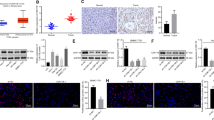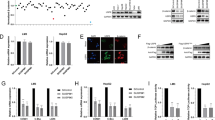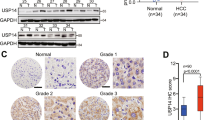Abstract
This study aims to explore the molecular regulation mechanism of ubiquitination-specific protease 7 (USP7) in facilitating the stemness properties of hepatocellular carcinoma (HCC). Gain-of-function and loss-of-function assays were conducted in SK-Hep1 and HepG2 cells transfected with USP7 overexpression/knockdown plasmids and USP7 inhibitor P22077. The proliferation, migration, invasion, and self-renewal capacity of hepatocellular carcinoma cells were detected by CCK-8, colony formation, Transwell, scratch, and tumor sphere formation, respectively. MS was performed to identify the potential substrate of USP7 following P22077 treatment. Co-IP assay was used to verify the interaction between USP7 and basic transcription factor 3 (BTF3) in HCC cells. The overexpression of USP7 could promote the proliferation, migration, invasion, and colony formation capacity of SK-Hep1 and HepG2 cells. Additionally, ectopic UPS7 enhanced the epithelial-mesenchymal transition (EMT) and stem-like characteristics of the HCC cells. In contrast, USP7 depletion by knockdown of USP7 or administrating inhibitor P22077 significantly inhibited these malignant phenotypes of SK-Hep1 and HepG2 cells. Following MS analysis, BTF3 was identified as a potential substrate for USP7. USP7 could interact with BTF3 and upregulate its protein level, while USP7 depletion significantly upregulated the ubiquitination levels. Overexpression of BTF3 partially rescue the inhibitory effects of USP7 depletion on the malignant phenotypes and stemness properties of SK-Hep1 and HepG2 cells. USP7 can promote the stemness and malignant phenotype of HCC by stabilizing BTF3.






Similar content being viewed by others
Data availability
No datasets were generated or analysed during the current study.
References
Anwanwan D, Singh SK, Singh S, Saikam V, Singh R (2020) Challenges in liver cancer and possible treatment approaches. Biochim Biophys Acta Rev Cancer 1873(1):188314
Atashzar MR, Baharlou R, Karami J, Abdollahi H, Rezaei R, Pourramezan F et al (2020) Cancer stem cells: a review from origin to therapeutic implications. J Cell Physiol 235(2):790–803
Babaei G, Aziz SG, Jaghi NZZ (2021) EMT, cancer stem cells and autophagy; the three main axes of metastasis. Biomed Pharmacother 133:110909
Barbato L, Bocchetti M, Di Biase A, Regad T (2019) Cancer stem cells and targeting strategies. Cells 8(8):926
Bian S, Ni W, Zhu M, Zhang X, Qiang Y, Zhang J et al (2022) Flap endonuclease 1 facilitated hepatocellular carcinoma progression by enhancing USP7/MDM2-mediated P53 inactivation. Int J Biol Sci 18(3):1022–1038
Bruix J, Gores GJ, Mazzaferro V (2014) Hepatocellular carcinoma: clinical frontiers and perspectives. Gut 63(5):844–855
Cai JB, Shi GM, Dong ZR, Ke AW, Ma HH, Gao Q et al (2015) Ubiquitin-specific protease 7 accelerates p14(ARF) degradation by deubiquitinating thyroid hormone receptor-interacting protein 12 and promotes hepatocellular carcinoma progression. Hepatology 61(5):1603–1614
Celia-Terrassa T, Jolly MK (2020) Cancer stem cells and epithelial-to-mesenchymal transition in cancer metastasis. Cold Spring Harb Perspect Med 10(7)
Chen M, Gutierrez GJ, Ronai ZA (2011) Ubiquitin-recognition protein Ufd1 couples the endoplasmic reticulum (ER) stress response to cell cycle control. Proc Natl Acad Sci USA 108(22):9119–9124
Chen ZZ, Huang L, Wu YH, Zhai WJ, Zhu PP, Gao YF (2016) LncSox4 promotes the self-renewal of liver tumour-initiating cells through Stat3-mediated Sox4 expression. Nat Commun 7:12598
Cheng J, Guo J, North BJ, Wang B, Cui CP, Li H et al (2019) Functional analysis of deubiquitylating enzymes in tumorigenesis and development. Biochim Biophys Acta Rev Cancer 1872(2):188312
Cheng X, Zhang B, Guo F, Wu H, Jin X (2022) Deubiquitination of FBP1 by USP7 blocks FBP1-DNMT1 interaction and decreases the sensitivity of pancreatic cancer cells to PARP inhibitors. Mol Oncol 16(7):1591–1607
Ching W, Koyuncu E, Singh S, Arbelo-Roman C, Hartl B, Kremmer E et al (2013) A ubiquitin-specific protease possesses a decisive role for adenovirus replication and oncogene-mediated transformation. PLoS Pathog 9(3):e1003273
Dongre A, Weinberg RA (2019) New insights into the mechanisms of epithelial-mesenchymal transition and implications for cancer. Nat Rev Mol Cell Biol 20(2):69–84
Fan YH, Cheng J, Vasudevan SA, Dou J, Zhang H, Patel RH et al (2013) USP7 inhibitor P22077 inhibits neuroblastoma growth via inducing p53-mediated apoptosis. Cell Death Dis 4(10):e867
Fang X, Yan Q, Liu S, Guan XY (2022) Cancer stem cells in hepatocellular carcinoma: intrinsic and extrinsic molecular mechanisms in stemness regulation. Int J Mol Sci 23(20):12327
Garros-Regulez L, Aldaz P, Arrizabalaga O, Moncho-Amor V, Carrasco-Garcia E, Manterola L et al (2016) mTOR inhibition decreases SOX2-SOX9 mediated glioma stem cell activity and temozolomide resistance. Expert Opin Ther Targets 20(4):393–405
Grunert S, Jechlinger M, Beug H (2003) Diverse cellular and molecular mechanisms contribute to epithelial plasticity and metastasis. Nat Rev Mol Cell Biol 4(8):657–665
Li M, Belmonte JC (2017) Ground rules of the pluripotency gene regulatory network. Nat Rev Genet 18(3):180–191
Li J, Dai Y, Ge H, Guo S, Zhang W, Wang Y et al (2022) The deubiquitinase USP7 promotes HNSCC progression via deubiquitinating and stabilizing TAZ. Cell Death Dis 13(8):677
Liao Y, Liu N, Xia X, Guo Z, Li Y, Jiang L et al (2019) USP10 modulates the SKP2/Bcr-Abl axis via stabilizing SKP2 in chronic myeloid leukemia. Cell Discov 5:24
Liu YC, Yeh CT, Lin KH (2020) Cancer stem cell functions in hepatocellular carcinoma and comprehensive therapeutic strategies. Cells 9(6):1331
Mevissen TET, Komander D (2017) Mechanisms of deubiquitinase specificity and regulation. Annu Rev Biochem 86:159–192
Mohiuddin IS, Wei SJ, Kang MH (2020) Role of OCT4 in cancer stem-like cells and chemotherapy resistance. Biochim Biophys Acta Mol Basis Dis 1866(4):165432
Najafi M, Farhood B, Mortezaee K (2019) Cancer stem cells (CSCs) in cancer progression and therapy. J Cell Physiol 234(6):8381–8395
Nakamura N (2018) Ubiquitin system. Int J Mol Sci 19(4):1080
Patra T, Cunningham DM, Meyer K, Toth K, Ray RB, Heczey A et al (2023) Targeting Lin28 axis enhances glypican-3-CAR T cell efficacy against hepatic tumor initiating cell population. Mol Ther 31(3):715–728
Siegel RL, Miller KD, Wagle NS, Jemal A (2023) Cancer statistics, 2023. CA Cancer J Clin 73(1):17–48
Walcher L, Kistenmacher AK, Suo H, Kitte R, Dluczek S, Strauss A et al (2020) Cancer stem cells—origins and biomarkers: perspectives for targeted personalized therapies. Front Immunol 11:1280
Zhao GY, Lin ZW, Lu CL, Gu J, Yuan YF, Xu FK et al (2015) USP7 overexpression predicts a poor prognosis in lung squamous cell carcinoma and large cell carcinoma. Tumour Biol 36(3):1721–1729
Zhao Y, Wang X, Wang Q, Deng Y, Li K, Zhang M et al (2018) USP2a supports metastasis by tuning TGF-beta signaling. Cell Rep 22(9):2442–2454
Funding
This study was supported by grants from National Natural Science Foundation (82272839, 81702419) and Postdoctoral Science Foundation of Jiangsu Province (2021K243B).
Author information
Authors and Affiliations
Contributions
W. Z., Z. T., and C. D. designed and supervised this study. M. H., Y. C., C. D., and S. B. conducted the experiments and drafted the manuscript. N. X., X. S., Z. L., and S. X. analyzed data and performed the statistics. All authors read and approved the final version of the manuscript.
Corresponding authors
Ethics declarations
Competing interests
The authors declare no competing interests.
Additional information
Publisher's Note
Springer Nature remains neutral with regard to jurisdictional claims in published maps and institutional affiliations.
Mingchao Hu, Chengchen Dai, and Xieyin Sun contributed equally to this study.
Rights and permissions
Springer Nature or its licensor (e.g. a society or other partner) holds exclusive rights to this article under a publishing agreement with the author(s) or other rightsholder(s); author self-archiving of the accepted manuscript version of this article is solely governed by the terms of such publishing agreement and applicable law.
About this article
Cite this article
Hu, M., Dai, C., Sun, X. et al. Ubiquitination-specific protease 7 enhances stemness of hepatocellular carcinoma by stabilizing basic transcription factor 3. Funct Integr Genomics 24, 28 (2024). https://doi.org/10.1007/s10142-024-01310-5
Received:
Revised:
Accepted:
Published:
DOI: https://doi.org/10.1007/s10142-024-01310-5




